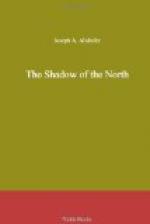Having resigned himself to necessity, he went back to bed and now, youth triumphing over excitement, he soon slept. The next morning, directly after breakfast, the three elders and the two lads went to the Royal Exchange, where there was soon a great concourse of merchants, clerks and seafaring men. Master Hardy was received with great respect, and many congratulations were given to him, when he told the story of the Good Hope and Captain Dunbar. In one of the rooms above the pillars he met another captain of his who had arrived the day before at New York itself.
This captain, a New England man, Eliphalet Simmons, had brought his schooner from the Mediterranean, and he told in a manner as brief and dry as his own log how he had outsailed one Barbary corsair by day, and by changing his course had tricked another in the night. But the voyage had been most profitable, and Master Jonathan duly entered the amount of gain in an account book, with a reward of ten pounds to Captain Simmons, five pounds to the first mate, three pounds to the second mate, and one pound to every member of the crew for their bravery and seamanship.
Captain Simmons’ thanks were as brief and dry as his report, but Robert saw his eyes glisten, and knew that he was not lacking in gratitude. After the business was settled and the rewards adjusted they adjourned to a coffee house near Hanover Square where very good Madeira was brought and served to the men, Robert and Tayoga declining. Then Benjamin, David and Jonathan drank to the health of Eliphalet, while the two lads, the white and the red, devoted their attention to the others in the coffee house, of whom there were at least a dozen.
One who sat at a table very near was already examining Tayoga with the greatest curiosity. He wore the uniform of an English second lieutenant, very trim, and very red, he had an exceeding ruddiness of countenance, he was tall and well built, and he was only a year or two older than Robert. His curiosity obviously had been aroused by the appearance of Tayoga in the full costume of an Iroquois. It was equally evident to Robert that he was an Englishman, a member of the royal forces then in New York. Americans still called themselves Englishmen and Robert instantly had a feeling of kinship for the young officer who had a frank and good face.
The English youth’s hat was lying upon the table beside him, and a gust of wind blowing it upon the floor, rolled it toward Robert, who picked it up and tendered it to its owner.
“Thanks,” said the officer. “’Twas careless of me.”
“By no means,” said Robert. “The wind blows when it pleases, and you were taken by surprise.”
The Englishman smiled, showing very white and even teeth.
“I haven’t been very long in New York,” he said, “but I find it a polite and vastly interesting town. My name is Grosvenor, Alfred Grosvenor, and I’m a second lieutenant in the regiment of Colonel Brandon, that arrived but recently from England.”




